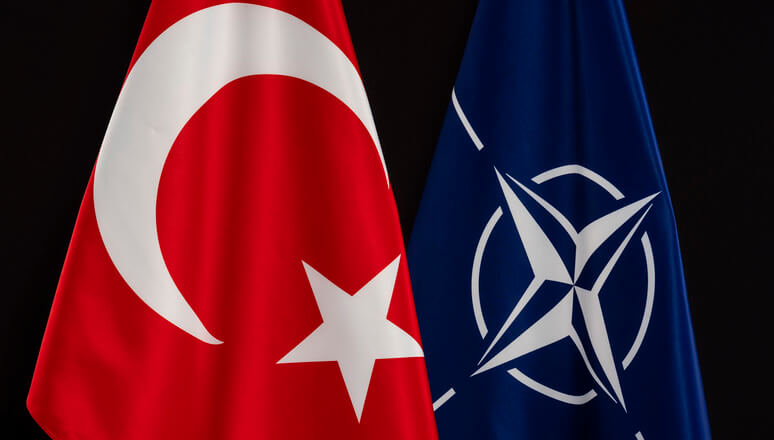At a time when the North Atlantic Treaty Organization (NATO) has attempted to maintain unity in light of Russia’s invasion of Ukraine, Turkey has taken several steps to establish fissures and widen divisions within the bloc. It has refused to impose sanctions on Moscow, opposed the membership bids of Finland and Sweden, and threatened fellow NATO member Greece with military action.
Against this backdrop, many NATO members have called to punish or even expel if from the grouping. Calls for such actions have not materialised, as the NATO charter does not have any such provisions. However, even if it were possible for NATO to expel rebellious members, Turkey’s virtual indispensability to NATO makes it very unlikely that members would follow through with such threats.
In fact, Turkey’s standing in NATO has risen dramatically following the outbreak of hostilities in eastern Europe. Firstly, Turkey’s control over the Bosphorus and Dardanelles straits, which connect the Black Sea with the Mediterranean Sea, gives NATO a geopolitical advantage over Russia. Ankara could essentially block Russian vessels going in and out of the Black Sea, thereby preventing Moscow from transporting logistics through to and from its Black Sea bases. Secondly, Turkey’s diplomatic role in the Ukraine war has been crucial to NATO. It has not only hosted several rounds of negotiations between Russian and Ukrainian diplomats but also successfully brokered a deal between the two rivals to allow the export of blocked Ukrainian grain.
Moreover, Ankara has supplied Kyiv with its flagship Bayraktar TB2 drones and the Ukrainian military has used them to deadly effect against Russian military equipment. In fact, the Oryx Blog estimates that Bayraktars have destroyed hundreds of Russian military equipment, including tanks, towed artillery, armoured vehicles, helicopters, ships, and missile systems.
Turkey’s increased importance within NATO have fuelled its ambitions to become a global power. In fact, apart from Ukraine, it has played a crucial role in either shaping or resolving conflicts in the South Caucasus, Libya, Syria, and Ethiopia.
Aware of its vital role in the alliance, Turkey has made increasingly bold demands to NATO, even if they directly contradict the group’s objectives and undermine its unity.
For example, it has recently taken a series of steps that have increased its decades-long tensions with Greece. Last month, it sent a drill ship to the contested waters of the Mediterranean, sparking furious reactions from Greece and Cyprus. Shortly afterwards, it claimed that Greek warplanes had violated Turkish airspace and that Greek anti-missile systems had locked on Turkish fighter jets.
President Recep Tayyip Erdoğan raised the stakes even further when, for the first time in the 50-year-long conflict, he accused Greece’s military of occupying the demilitarised Aegean islands and warned of a Turkish military response if Greece does not retreat. These renewed tensions have raised the spectre of another European war, which could severely disrupt unity within NATO.
Erdogan continues to act like a bully & not a NATO ally. I hope the @WhiteHouse & my colleagues see why it’s dangerous & ill-advised to sell US fighter jets to Turkey that can be used against Greece & destabilizing to the Eastern Mediterranean region. https://t.co/uSgGd1UGsS
— Office of Rep. Nicole Malliotakis (@RepMalliotakis) September 8, 2022
Furthermore, Erdoğan has called on the United States (US) to halt the supply of next-generation F-35 fighter jets to Greece, as this would result in Turkey losing its air superiority over the Aegean to Greece.
Turkey has also extended its disruptive actions to the Ukraine-Russia war. While it has condemned Russia’s invasion of Ukraine, it has refused to level sanctions against Moscow. Furthermore, while NATO members and the West have tried to reduce their dependence on Russian energy, Turkey has taken the opposite direction. Last month, following a meeting with Russian President Vladimir Putin, Erdoğan announced that Turkey would pay for part of its natural gas imports from Russia in rubles. Erdoğan also noted that several Turkish banks have adopted the Russian Mir payments system to transact with Russian companies, a move that would allow the latter to bypass SWIFT restrictions.
This could be a way of pressuring the US to allow Turkey to be a part of the F-35 programme, which it was kicked out of over Erdoğan’s decision to purchase Russia’s S-400 missile defence system. The president has also criticised the US for proving refuge to FETÖ members, including Fethullah Gülen, who Erdoğan claims is the mastermind of the 2016 coup.
Turkey also aimed to gain significant concessions through its initial reluctance to support Finland and Sweden’s NATO membership bids, asserting that it would refuse to approve their accession unless they extradite Kurdish “terrorists,” a condition the two Nordic countries appear increasingly willing to accept. At the same time, Turkey announced new offensives in Syria and Iraq to combat Kurdish groups like the People’s Protection Units (YPG) and the Kurdistan Worker’s Party (PKK).
Taking all of this into consideration, it has become abundantly clear that Turkey is leveraging its indispensability to NATO to make difficult demands that the alliance may want to but cannot afford to outright reject. Ankara is also incentivised to continue with this behaviour because it could boost the domestic popularity of Erdoğan’s AKP party, especially as the party’s ratings plummet amid the country’s worsening economic crisis. Turkey is headed to the polls next year and Erdoğan is no doubt keen to show his leading role in increasing Turkey’s standing in world politics
Turkey has proved to be a crucial partner for NATO yet at the same time taken steps to undermine the alliance. While it may be possible for NATO members to amend the charter to include provisions to punish Ankara, as many experts have suggested, such an action would result in the organisation losing a key partner, endangering vital geopolitical interests, and pushing away a crucial negotiator in the Russia-Ukraine conflict. It thus stands to reason that NATO will either tolerate Turkey’s actions or accede to its demands.

